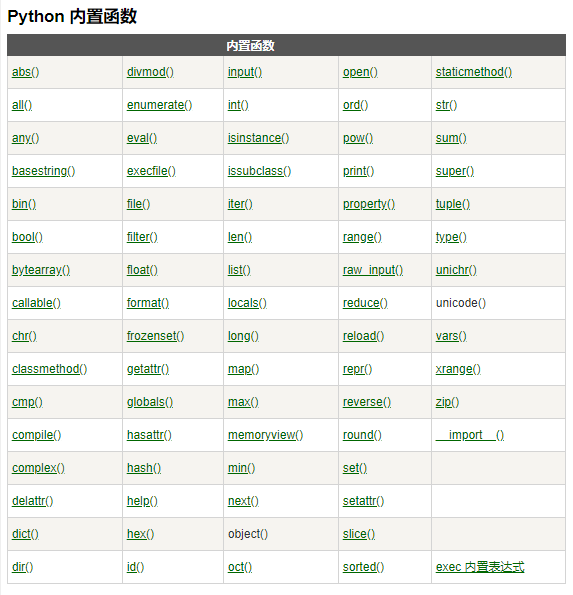Python 内置函数:https://www.runoob.com/python/python-built-in-functions.html
原文:https://www.cnblogs.com/linhaifeng/articles/6113086.html#_label12

# 绝对值 # print(abs(-1)) # print(abs(1)) # # 有一个为假就false,如果为空就是true # Return True if bool(x) is True for all values x in the iterable. # If the iterable is empty, return True. # print(all([1,2,'1']))#True # print(all([1,2,'1','']))#False # print(all('1230'))#True # print(all(''))#True # 有一个是真,就是true # print(any([0,''])) # print(any([0,'',1])) # 转2进制 # print(bin(3)) #空,None,0的布尔值为False,其余都为True # print(bool('')) # print(bool(None)) # print(bool(0)) # 加码解码 # name='你好' # print(bytes(name,encoding='utf-8')) # print(bytes(name,encoding='utf-8').decode('utf-8')) # # print(bytes(name,encoding='gbk')) # print(bytes(name,encoding='gbk').decode('gbk')) # # print(bytes(name,encoding='ascii'))#ascii不能编码中文 # chr() 用一个范围在 range(256)内的(就是0~255)整数作参数,返回一个对应的字符。 # print(chr(46)) # dir() 函数不带参数时,返回当前范围内的变量、方法和定义的类型列表; # 带参数时,返回参数的属性、方法列表。如果参数包含方法__dir__(),该方法将被调用。 # 如果参数不包含__dir__(),该方法将最大限度地收集参数信息。 # print(dir(dict)) # python divmod() 函数把除数和余数运算结果结合起来,返回一个包含商和余数的元组(a // b, a % b)。 # print(divmod(10,3)) # dic={'name':'alex'} # dic_str=str(dic) # print(dic_str) #可hash的数据类型即不可变数据类型,不可hash的数据类型即可变数据类型 # print(hash('12sdfdsaf3123123sdfasdfasdfasdfasdfasdfasdfasdfasfasfdasdf')) # print(hash('12sdfdsaf31231asdfasdfsadfsadfasdfasdf23')) # # name='raito' # print(hash(name)) # print(hash(name)) # # # print('--->before',hash(name)) # name='sb' # print('=-=>after',hash(name)) # help() 函数用于查看函数或模块用途的详细说明。 # print(help(all))Python 内置函数 # print(bin(10))#10进制->2进制 # print(hex(12))#10进制->16进制 # print(oct(12))#10进制->8进制 # isinstance() 函数来判断一个对象是否是一个已知的类型,类似 type()。 # # isinstance() 与 type() 区别: # # type() 不会认为子类是一种父类类型,不考虑继承关系。 # # isinstance() 会认为子类是一种父类类型,考虑继承关系。 # # 如果要判断两个类型是否相同推荐使用 isinstance()。 # print(isinstance(1,int)) # print(isinstance('abc',str)) # print(isinstance([],list)) # print(isinstance({},dict)) # print(isinstance({1,2},set)) # name='奋斗奋斗奋斗东方的' # print(globals()) # print(__file__) # # def test(): # age='1111111111111111111111111111111111111111111111111111111111111' # # print(globals()) # print(locals()) # # test() # l=[1,3,100,-1,2] # print(max(l)) # print(min(l))



 浙公网安备 33010602011771号
浙公网安备 33010602011771号